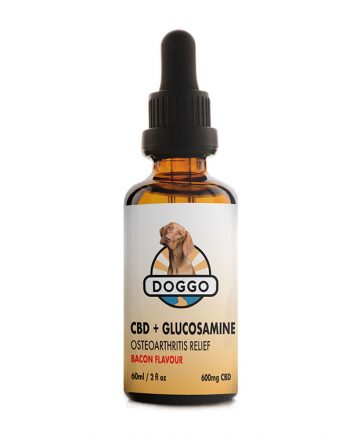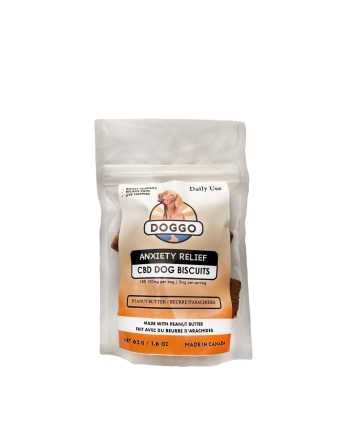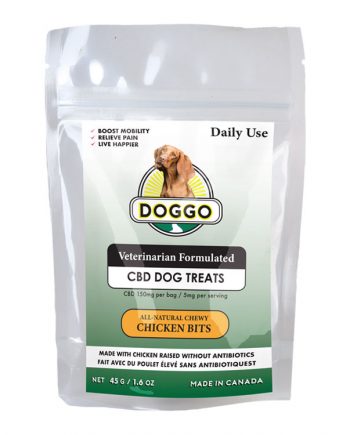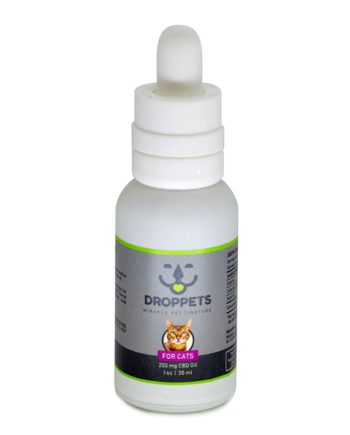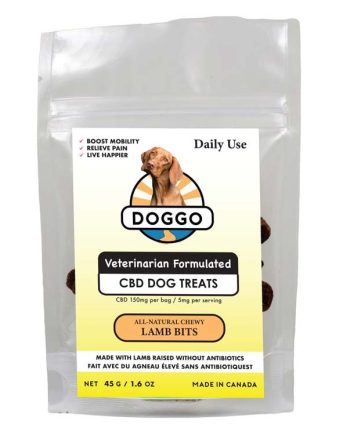Doggo
-
CBD & Glucosamine Arthritis Relief CBD Oil – Doggo
$75.00 Add to cart -
Anxiety Relief Dog Treats – Peanut Butter – Doggo
$24.00 Add to cart -
Chewy CBD Dog Treats – Chicken – Doggo
$24.00 Add to cart -
CBD Oil for Cats – DropPets – 250mg
$31.00 Add to cart -
Chewy CBD Dog Treats – Lamb – Doggo
$24.00 Add to cart
What to consider before buying CBD oil for dogs
With so many different pet CBD products on the market, purchasing CBD oil for dogs in Canada can be difficult. Here are our tips for selecting the perfect CBD oil tincture for your pup:
- Ensure safe THC-levels: All pet CBD extracts should contain zero or less than 0.3% THC. This is the official threshold below which CBD products are considered non-intoxicating and non-psychoactive (not capable of causing a high).
- Independent lab certifications: Always make sure the canine CBD product you are buying in Canada comes with a certificate of analysis that shows the CBD was tested and safe. For peace of mind, all CBD oils & treats for dogs we carry have been tested and certified by independent labs.
- How picky your pup is: Different CBD oils can have more or less mild tastes. Flavoured oils, like Honest Botanicals Bacon CBD oil for dogs, can make it easier to give your pup. Treats can also be easier to administer, but are not absorbed as well as CBD oils.
All-natural carrier oils high in healthy fats
More CBD is absorbed by the body when it’s consumed with high-quality fatty foods. This is one of the main reasons why CBD is most commonly sold in oil tinctures, and why we usually recommend CBD oils for dogs rather than treats and creams.
The best types of carrier oil are packed with healthy omega fats. The most popular two are hemp seed oil and medium-chain triglyceride (MCT) oil:
- MCT oil is usually made from coconuts and has a softer taste than cannabis seed oil.
- Hempseed oil contains a powerful blend of omega-6 and omega-3 fats, antioxidants, and amino acids, but are harder on dog’s stomachs than MCT oil.
CBD oil vs. CBD treats for dogs?
For general use, a pet CBD oil tincture is the best option. When taken with healthy fats, like MCT oil, CBD is absorbed up to 4 times more versus low or no-fat treats. CBD oils also allow owners to vary their pup’s dosage more accurately, using the measuring tincture as opposed to breaking a treat in half.
CBD treats, on the other hand, offer owners a pre-dosed CBD format that’s easy to administer. Treats can also be conveniently transported around when on walks or at the dog park.
Starting CBD dosage for dogs
While there is no official recommended dose for pet CBD products, most CBD brands and animal health professionals recommend starting with a small dose of CBD and only increasing levels after a few days of consistent observation. As a natural supplement, CBD can take some time to begin to work, so it’s important to take things at a steady pace.
We recommend an initial dose of 0.2 mg of CBD per pound of dog body weight, which equals around 10 – 15 mg of CBD for a medium-sized pup. Remember that CBD extracts are infused into oil, so the amount of CBD oil in ml doesn’t equal that amount of active infused ingredient.
How much CBD oil can you give your dog?
The amount of CBD oil you give your dog should depend upon their needs. Dogs taking CBD for joint diseases or other chronic inflammatory conditions should respond well to a moderate dose given on a daily basis. CBD to treat anxiety conditions, on the other hand, is usually best given as a low daily dose.
Studies and anecdotal evidence show that CBD is well tolerated by dogs, with only minor side effects occasionally reported. (These include nausea, dizziness, and diarrhea). Even at high dosages, no overdoses or other serious incidents are known to have occurred.
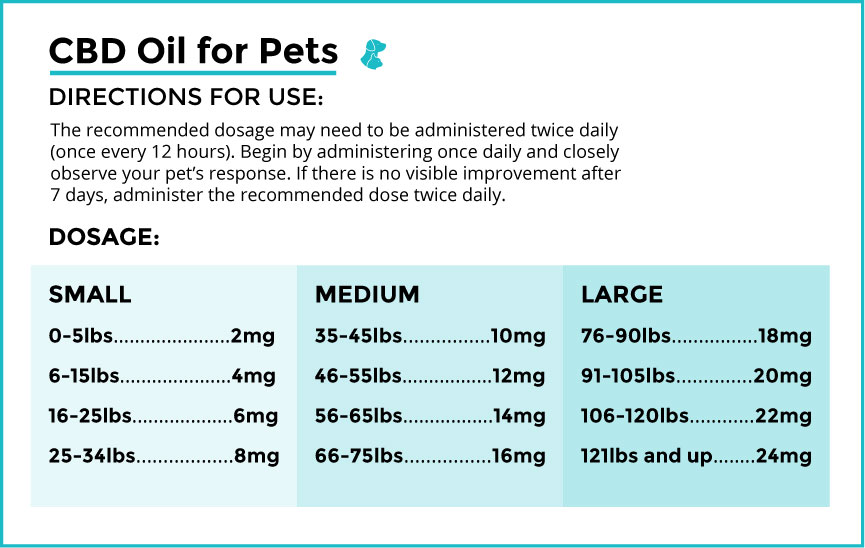
How do I give my dog CBD oil?
CBD oil is a versatile product, allowing pet owners to find the best way of using CBD for their pup’s particular needs.
There are two main ways to administer CBD oil for dogs:
Orally: If your dog is the type to get suspicious of tinctures and pills, the simplest way to give them CBD is by dropping their dose into their food. Adding CBD oil to a dog’s dinner helps them to digest the maximum amount of CBD.
Sublingually: Sublingual application means dropping CBD oil into a dog’s mouth. The aim here is to get the CBD oil under their tongue or onto their gums where fine blood vessels are near the surface. This allows for super-fast absorption, while any remaining CBD is digested.
Do vets recommend CBD oil for dogs?
Right now, CBD is not approved by major veterinary regulation boards, which means that most veterinarians cannot officially recommend or prescribe CBD.
However, many veterinarians Canada-wide already recognize the popularity of CBD pet products and know many pet owners who choose to give CBD products to their dogs. You should feel free to discuss CBD options with your dog’s healthcare provider.
How will I know if my dog’s CBD oil is working?
Even the best CBD oil for dogs is unlikely to make an immediate difference to your pup’s symptoms. Like most health supplements, it can take several days or weeks of consistent doses before effects become visible.
While some dogs show easily noticeable improvements after taking CBD, others may have more subtle responses. Here are some signs that your dog’s CBD is taking effect:
1. Increased mobility: One of the most common things that owners of dogs taking CBD observe are improvements in their pet’s ability to stand, sit, and walk around. Dogs with arthritis or hip dysplasia who respond to CBD often stop licking or biting at their hinds, and may rediscover their love of walks.
2. Changes in communicative behavior: When dogs are suffering from stress and inflammation, they may respond by becoming passive, shy, non-responsive, or even aggressive. If CBD is having a positive effect on inflammation-related stress and anxiety, dogs can return to previous levels of vocalization, eye contact, energy, and other communication habits.
3. Reduction of symptoms: CBD won’t cure any canine condition, but as it takes effect, it should reduce the frequency, duration, or intensity of symptoms. That means fewer aches, pains, or anxiety episodes for your dog!

